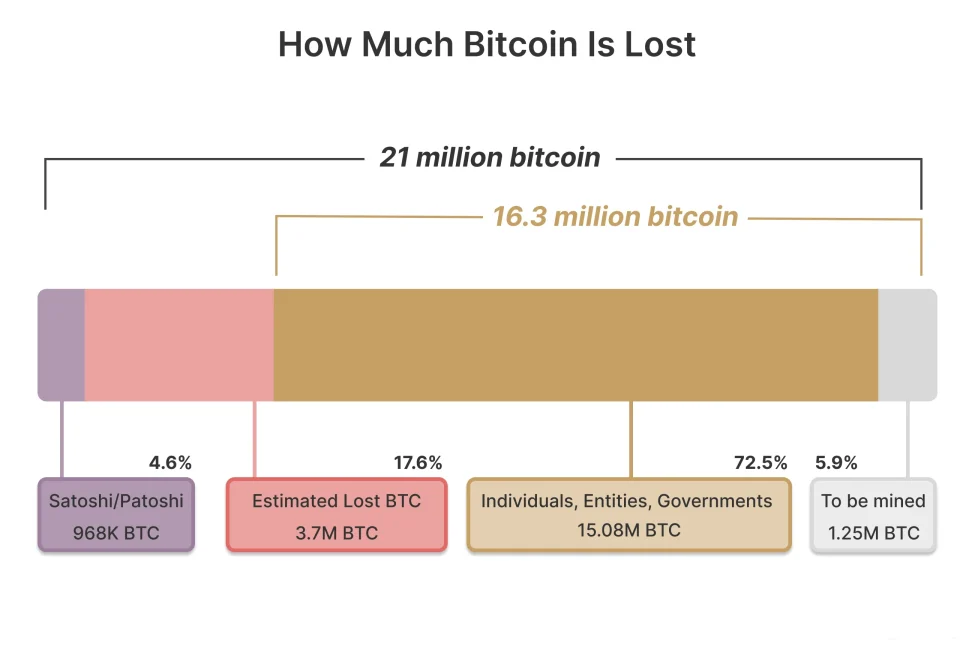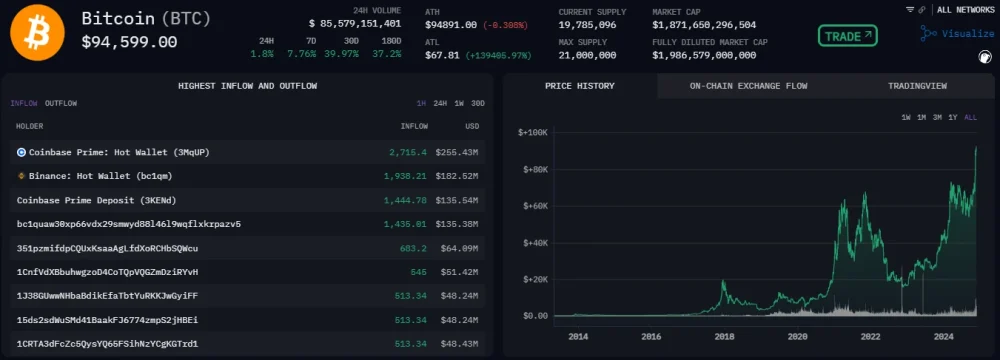Introduction
Bitcoin, the revolutionary digital currency, has taken the world by storm. With its decentralized nature and the promise of financial autonomy, it has attracted millions of users worldwide.
However, this unprecedented rise in popularity has also brought about a hidden challenge – lost bitcoins. In this article, I will dig into the depths of forgotten wallets and explore the question that many have pondered: how many bitcoins are lost?
Please read it, comment it and share, of course!
The Concept of Bitcoin Wallets

Before we dive into the world of lost bitcoins, it is crucial to understand the concept of bitcoin wallets and their significance. A bitcoin wallet is essentially a digital wallet that allows users to store, send, and receive bitcoins. It is akin to a traditional bank account, but with a key difference – it operates on the blockchain, a decentralized ledger technology.
Bitcoin wallets can be categorized into two types: hot wallets and cold wallets. Hot wallets are connected to the internet and are ideal for frequent transactions, whereas cold wallets are offline devices that provide enhanced security for long-term storage.
Regardless of the type, the importance of a bitcoin wallet cannot be understated. It is the gateway to your digital assets and serves as a digital key to access your funds.
Factors Contributing to Lost Bitcoins
Now that we have a basic understanding of bitcoin wallets, let us explore the factors that contribute to lost bitcoins.
One of the primary causes is human error. Users may forget their wallet passwords or lose access to their private keys, rendering their bitcoins inaccessible forever.
Additionally, hardware failure, such as a malfunctioning hard drive or a damaged device, can result in the loss of bitcoins.
Another factor that contributes to lost bitcoins is the lack of proper backup procedures. Many users fail to create backups of their wallets, leaving them vulnerable to data loss.
In some cases, individuals may have stored their bitcoins on an exchange platform that subsequently goes out of business or experiences a security breach, resulting in the loss of funds.
The Size of the Lost Bitcoin Problem
The magnitude of the lost bitcoin problem is staggering. According to a study conducted by Chainalysis, a blockchain analysis company, approximately 20% of the existing 18.5 million bitcoins are considered lost or inaccessible.

This translates to a staggering 3.7 million bitcoins, worth billions of dollars at the current market rate. These lost bitcoins are scattered across forgotten wallets, unrecoverable hard drives, and inaccessible accounts, leaving their owners in a state of despair.

There is still about 6% of the supply for Bitcoin.
We are still early, because this is only the 4th halving behind us.
Either way, this year was a breakthrough.
The year 2024 turned out to be the year of listing Bitcoin ETFs by many large financial institutions.
By the way, Trump was elected president of the United States. This is certainly good news for cryptocurrency enthusiasts. This has consequences such as the establishment of budget reserves in Bitcoin. Big move, and there are not that many Bitcoins left.
You could say that about 4.6 million will remain in HODL mode for the next 100 years!
If I write about Bitcoin, it is probably worth thinking about this asset as an asset for the next 30 or more years.
It is the act of inheriting the wealth of generations. This is what came to my mind while writing this part.
Famous Cases of Lost Bitcoins
Over the years, there have been several high-profile cases of lost bitcoins that have captured the attention of the cryptocurrency community.
One such case is that of James Howells, a British IT worker who accidentally threw away a hard drive containing 7,500 bitcoins. As of today, those bitcoins would be worth millions of dollars. Despite numerous attempts to locate the hard drive in a landfill site, his bitcoins remain lost forever.

Another notorious case is that of Mt. Gox, once the largest bitcoin exchange in the world. In 2014, Mt. Gox filed for bankruptcy after approximately 850,000 bitcoins were stolen from its platform. The subsequent investigation revealed that a significant portion of these bitcoins were lost due to poor security practices and mismanagement.

This incident not only resulted in the loss of funds for thousands of users but also shook the confidence of the entire bitcoin community.
Is it a Bitcoin Wallet Lost
If you suspect that your bitcoin wallet may be lost, there are a few steps you can take to verify its status.
First and foremost, check all your devices and storage mediums to ensure that you have not misplaced or forgotten any wallets. If you have a backup of your wallet, try restoring it using the appropriate software or service. In some cases, you may need to consult a professional in the field of bitcoin wallet recovery.
Additionally, you can check blockchain explorers, which are online tools that allow you to search for specific bitcoin addresses and view their transaction history. If you find that your wallet has not been active for an extended period, it may be an indication that your bitcoins are lost.
However, it is essential to exercise caution and seek expert advice before drawing any conclusions.

There are many tools for viewing blockchains, including Bitcoin.
In fact, I mentioned it in one of the articles. I encourage you to read it.
The tool presented in the article is a block explorer from Arkham.
Due to the clear user interface, I recommend this solution!
How Recover a Lost Bitcoin Wallet

While the recovery of a lost bitcoin wallet can be a daunting task, it is not entirely impossible. Here are some steps you can take to increase your chances of reclaiming your lost bitcoins:
Gather all available information. Collect any relevant details about your lost wallet, including wallet addresses, transaction history, and backup files. This information will be crucial during the recovery process.
Seek professional assistance. If you are unable to recover your wallet on your own, consider reaching out to experts in the field of bitcoin wallet recovery. These professionals have specialized tools and knowledge that can help in the retrieval of lost bitcoins.
Explore alternative recovery methods. In some cases, there may be alternative methods to recover your lost bitcoins. For example, if you have forgotten your wallet password, you can try using a password recovery tool or seek assistance from a professional.
Remember, the process of recovering a lost bitcoin wallet can be time-consuming and may not always yield positive results. It is essential to manage your expectations and be prepared for the possibility of irreversible loss.
How to Avoid Losing Bitcoins

While the recovery of lost bitcoins is challenging, it is always better to prevent their loss in the first place. Here are some preventive measures you can take to safeguard your digital assets:
Backup your wallets. Regularly create backups of your bitcoin wallets and store them in secure locations. This ensures that even if you lose access to one wallet, you can restore it using the backup.
Use hardware wallets. Consider using hardware wallets, such as Trezor or Ledger, for long-term storage of your bitcoins. These devices provide enhanced security and protect your funds from online threats.
Exercise caution with exchanges. Be cautious when using cryptocurrency exchanges to store your bitcoins.
Research the reputation and security practices of the exchange before depositing funds. It is also advisable to withdraw your bitcoins to a personal wallet whenever possible.
The Future of Lost Bitcoins

The problem of lost bitcoins is likely to persist in the future, as more users join the cryptocurrency revolution. As the supply of bitcoins becomes scarcer due to lost coins, the value of the remaining bitcoins may increase significantly. This phenomenon, known as the “scarcity effect,” could potentially drive up the price of bitcoin and impact the overall bitcoin market.
Furthermore, the lost bitcoins also contribute to the deflationary nature of bitcoin. With a limited supply and a constant demand, the scarcity of bitcoins due to loss further strengthens its deflationary qualities.
This unique attribute sets bitcoin apart from traditional fiat currencies and adds to its appeal as a store of value.
Conclusion
In conclusion, the question of how many bitcoins are lost in forgotten wallets is a complex one. While it is challenging to determine an exact figure, it is evident that the problem of lost bitcoins is significant. The cases of lost bitcoins serve as cautionary tales, reminding us of the importance of proper wallet management and backup procedures.
As the bitcoin market continues to evolve, it is crucial for users to be proactive in protecting their digital assets. By following preventive measures and staying informed about the latest security practices, we can minimize the risk of losing bitcoins and ensure the long-term viability of this revolutionary digital currency.
Don’t let your bitcoins become another statistic in the pool of lost coins. Take the necessary steps to safeguard your digital wealth and explore the exciting possibilities that await in the world of cryptocurrencies.

Leave a Reply
You must be logged in to post a comment.